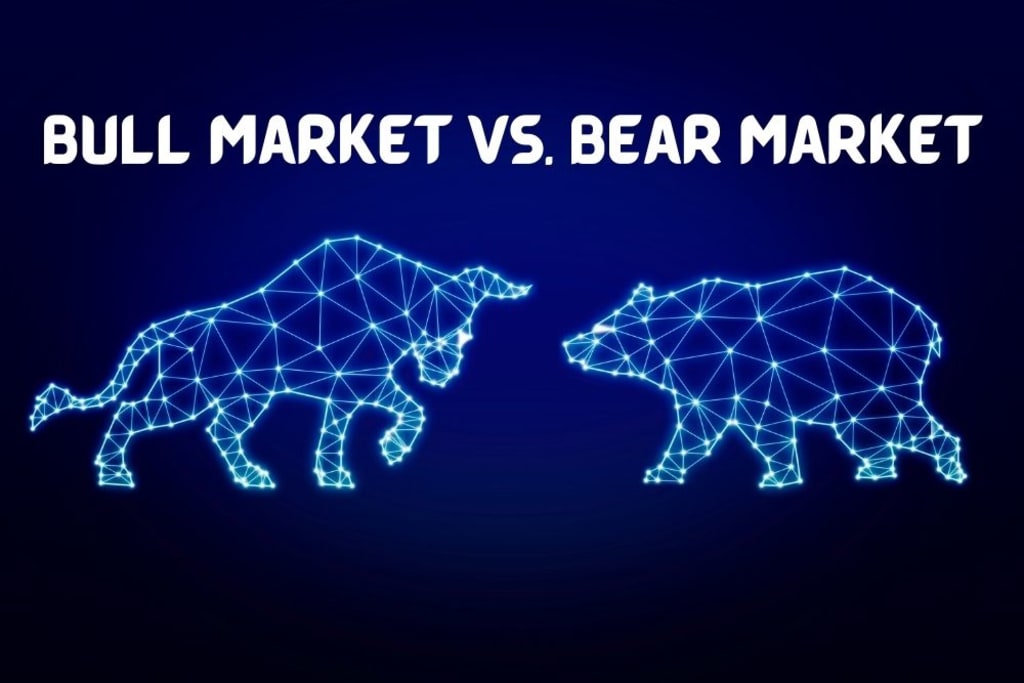Bull Market vs. Bear Market
Bull Market vs. Bear Market

A bull market is one at where prices are rising and economic conditions are generally positive. A bear market develops when the economy is weakening and the majority of stocks are losing value. Because investor attitudes have a significant impact on financial markets, these phrases also refer to how the investors feel about the market and the resulting economic developments.
A prolonged increase in prices characterises a bull market. A bull market in equities markets refers to a rise in the price of a company's stock. During these periods, investors frequently believe that the uptrend will continue in the long run. The country's economy is normally strong in this scenario, and job levels are high.
A bear market, on the opposite side, is one that is in decline. Unless a market has lost 20% or more from recent highs, it is usually regarded as a true "bear" market. Share prices are constantly falling in a bear market. As a result, investors assume the downward trend will continue, perpetuating the downward spiral. Particularly During a bear market, the economy slows down relatively and unemployment grows as businesses cut staff.
What is a Bull Market?
Bull markets are characterised by a market that rises rapidly over a long period of time. As the stock market begins to rise, there is an increase in stock market greed. “Oh yeah, let's invest money into the market because it's going up,” you see more and more people thinking.
What Causes a Bull Market?
Though a bull market is caused by a variety of reasons, the two most important are usually
A healthy economy
Across the board, there is a high degree of employment.
What is a Bear Market?
The definition of a bear market is the polar opposite of a bull market. It's a market where the market drops roughly 20% per quarter. This indicates a bear market, and when this occurs, people become extremely hesitant to invest in the stock market. This is due to their lack of understanding on how to invest in the Rule #1 way.
Why is it Called a Bear Market?
A bear market is so named because of the way this specific animal attacks its prey. During an attack, a bear swipes downward, creating a metaphor for market behaviour in these circumstances.
What Causes a Bear Market?
A bear market, in general, is one that is showing signs of deterioration. Share prices are falling to the point where experienced investors feel the trend will continue, at least for the time being.
Investor Psychology
Investor psychology and emotion influence whether the market rises or falls since the market's behaviour is influenced and determined by how individuals perceive and react to it. Investor psychology and stock market performance are intertwined. Investors willingly join in a bull market in the hopes of making a profit.
Market sentiment is negative during a bear market, and investors begin to shift their money out of stocks and into fixed-income instruments as they wait for the stock market to recover. In conclusion, the stock market's collapse has shattered investor confidence. This causes investors to withdraw their entire funds from the market, resulting in a general price decrease as the outflow rises.
What’s Considered a Bear Market?
A bear market, according to most analysts, is one in which stock values have plummeted 20% or more from recent highs, causing widespread pessimism among investors.
How Long Do Bear Markets Last?
The length of a bear market varies greatly depending on the circumstances. Some bear markets endure only a few weeks, while others might linger for years. Depending on the contributing variables, a cyclical bear market can extend several years.
Bear Market History
Since 1926, there have been eight real bear markets. Their durations ranged from six months to almost three years, with one lasting only six months and the other nearly three years. The S&P 500 dropped 83 percent in the worst of them, while the S&P 500 dropped 21.8 percent in the best of them.
Bear Market Example
The 1987 market crash, that saw a 29.6 percent decrease over the course of three months, is one of the most well-known examples of a bear market.
Bull vs Bear Markets
It's vital to remember that a bull market is marked by a general sense of optimism and positive growth, both of which tend to fuel greed. A bear market is coupled with a general sense of deterioration, which causes stockholders to be fearful. When it arrives to bull vs bear markets, Rule #1 investors act in the other direction of the investing public, capitalising on their emotions by finding great stocks at low prices during bad markets and selling during bull markets when they've regained their worth.
Should You Buy in a Bear Market?
Rule#1 Investing is all about exploiting fear and greed. When we are afraid, we like to buy. In other words, we want to be buyers when the market is falling. We enjoy being sellers when the market is rising.
The most important thing to remember about Rule #1 Investing is that we move virtually exactly in the opposite direction of the majority of people in the market. We profit from the bulls and bears.
In a bear market, where most people are terrified or worried, we're trying to acquire $10 bills for $5. We become quite enthusiastic because it's like going to a flea market where everything is on sale.
“What if you buy that stock and it falls down even more?” is a question we are frequently asked.
We hope the stock drops even more when we buy!
When the stock price falls more, we like to buy more. It's fantastic when the stock rises again because that's when we can start collecting our profits.
Finally, whether it's a bear market or a bull market, we do the exact opposite of what everyone else is doing.
Conclusion
Both bear and the bull markets will have a significant impact on your finances, so it's a good idea to spend some time researching the market before making a decision. Keep in mind that the stock market has always produced a good return over time.





Comments
There are no comments for this story
Be the first to respond and start the conversation.